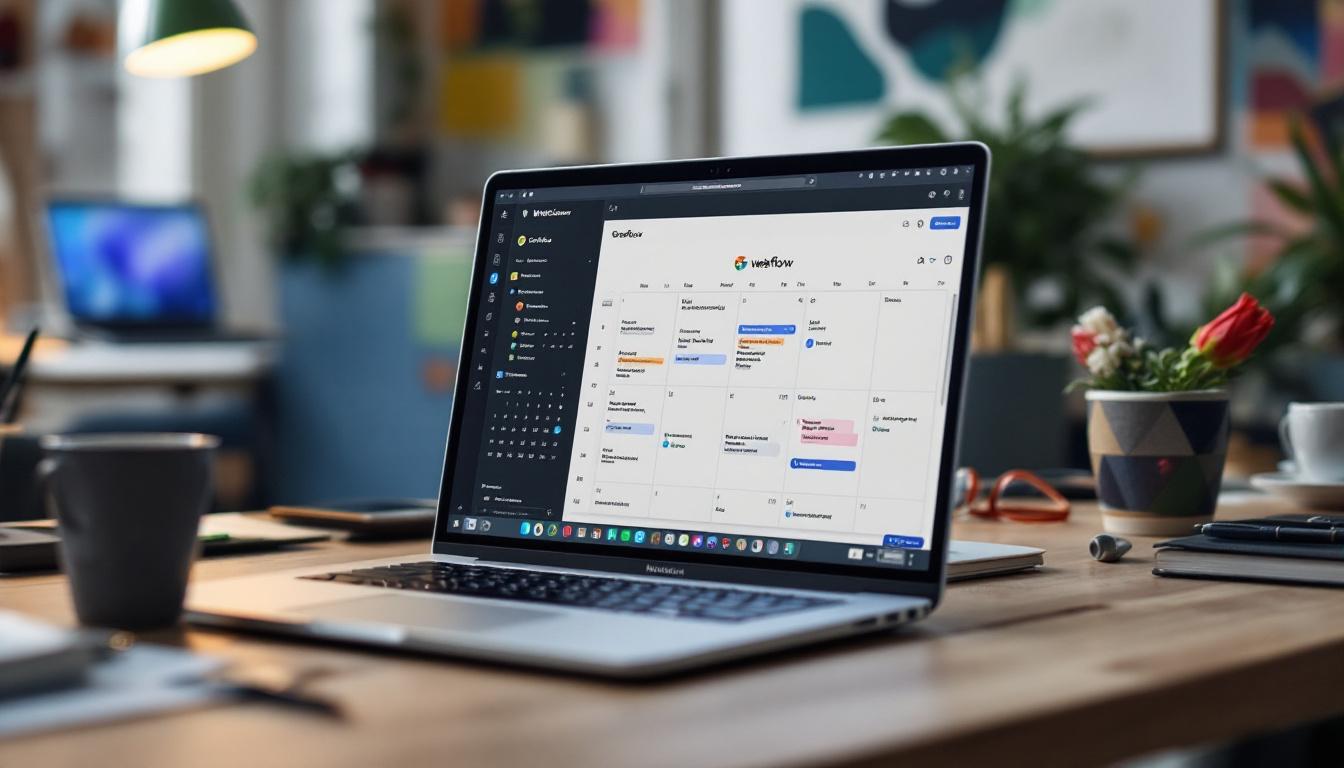Webflow Google Calendar Integration
.webp)
Webflow Google Calendar Integration
In today's dynamic digital environment, optimizing workflows and boosting productivity is essential for both businesses and individuals. A powerful method to achieve this is by integrating Webflow with Google Calendar. This article delves into the intricacies of this integration, emphasizing its advantages, potential hurdles, and offering a detailed guide to help users enhance their efficiency.
Understanding Google Calendar
Google Calendar is a popular time management tool that enables users to organize events, set reminders, and share schedules. Its intuitive interface and comprehensive features make it indispensable for personal and professional use. Users can create multiple calendars, color-code events, and establish recurring appointments, simplifying the management of hectic schedules. Customizable notifications ensure users are always informed about upcoming events, whether through email alerts, pop-up reminders, or mobile notifications, catering to diverse preferences and lifestyles.
Additionally, Google Calendar integrates effortlessly with various applications, enhancing its utility. This feature allows users to receive notifications, sync events across devices, and collaborate with team members in real-time. By connecting Google Calendar with other platforms, users can streamline their scheduling processes and ensure they never miss an important event. For example, integration with Google Meet facilitates seamless video conferencing, allowing users to add virtual meeting links directly to their events. Furthermore, the calendar can be synced with productivity tools like Trello and Asana, enabling users to manage tasks and deadlines in one place, thereby promoting efficiency and organization.
Another notable feature of Google Calendar is its ability to display public holidays and events based on the user's location. This helps individuals plan their schedules around significant dates, such as national holidays or local festivals, ensuring they can maximize their time off. Users can also subscribe to calendars that track sports events, TV shows, or other interests, making it easy to stay updated on activities that matter to them. The sharing capabilities extend beyond individual users; organizations can create shared calendars for teams, departments, or entire companies, fostering better communication and collaboration across various projects and initiatives.
Advantages of Linking Webflow and Google Calendar
Integrating Webflow with Google Calendar provides numerous benefits that can significantly enhance workflow efficiency. This connection allows users to synchronize their projects and schedules, ensuring all team members are aligned. Below are some key advantages of this integration.

Boosted Scheduling Efficiency
One of the primary benefits of linking Webflow and Google Calendar is the enhancement of scheduling efficiency. Users can automatically populate their calendars with deadlines, meetings, and project milestones directly from Webflow. This automation reduces the need for manual entry, minimizing the risk of errors and ensuring that important dates are not overlooked.
Additionally, team members can easily access shared calendars, allowing for better coordination and communication. This transparency fosters a collaborative environment where everyone is aware of upcoming tasks and deadlines, leading to smoother project execution. By having a centralized schedule, teams can also identify potential conflicts in availability, making it easier to reschedule meetings or adjust timelines as necessary.
Enhanced Project Management
Project management becomes more streamlined when Webflow is integrated with Google Calendar. Users can assign tasks, set deadlines, and monitor progress all in one place. By having a clear overview of project timelines and responsibilities, teams can prioritize tasks effectively and allocate resources where they are needed most.
Furthermore, the integration allows for real-time updates. Any changes made in Webflow can be instantly reflected in Google Calendar, ensuring that all stakeholders are informed of the latest developments. This dynamic approach to project management can significantly enhance productivity and reduce the likelihood of miscommunication. Additionally, the ability to set reminders and notifications for upcoming deadlines helps keep everyone accountable and focused on their responsibilities, ultimately leading to higher quality outcomes.
Moreover, the integration can also support better time management practices. With Google Calendar's features, users can block out time for specific tasks or meetings, ensuring that they allocate sufficient time for each project phase. This structured approach can help prevent burnout, as team members can see their workload visually and make adjustments as needed. By leveraging these tools together, teams can cultivate a more organized and efficient work environment, where everyone can thrive and contribute effectively to their projects.
Common Integration Challenges
While the integration of Webflow and Google Calendar offers numerous benefits, it is not without its challenges. Understanding these potential issues can help users prepare and navigate them more effectively.

Data Synchronization Issues
One of the most common challenges faced during integration is data synchronization. Users may encounter discrepancies between the information displayed in Webflow and what appears in Google Calendar. This can lead to confusion and hinder effective project management.
To mitigate these issues, it is essential to regularly check for updates and ensure that both platforms are syncing correctly. Users should also familiarize themselves with the integration settings to understand how data flows between the two applications. Regular maintenance can help maintain consistency and accuracy in scheduling. Furthermore, leveraging automated tools or scripts to monitor data changes can provide an additional layer of assurance, alerting users to any discrepancies in real time, thus allowing for prompt corrections.
User Experience Challenges
Another challenge that users may face is related to user experience. The integration process can sometimes be complex, especially for those who are not tech-savvy. Navigating through settings and configurations may lead to frustration, potentially discouraging users from fully utilizing the integration.
To address these concerns, providing clear instructions and support resources is crucial. Users should have access to guides and troubleshooting tips to help them navigate the integration process smoothly. A positive user experience is vital for encouraging adoption and maximizing the benefits of the integration. Additionally, offering interactive tutorials or video walkthroughs can significantly enhance understanding, making the process more approachable. Engaging with user feedback can also lead to continuous improvements in the integration process, ensuring that it evolves in line with user needs and technological advancements.
Step-by-Step Guide to Integration
For those looking to integrate Webflow with Google Calendar, following a structured approach can simplify the process. Below is a step-by-step guide to help users connect these two powerful tools effectively.
Prerequisites for Integration
Before starting the integration process, users should ensure they have the necessary prerequisites in place. This includes having an active Google account and a Webflow account. Additionally, users should familiarize themselves with the integration settings available in both platforms.
It is also advisable to have a clear understanding of the specific events or data that need to be synchronized. This foresight will help streamline the integration process and ensure that users achieve their desired outcomes. For instance, consider whether you want to sync all events or only specific ones, such as team meetings, project deadlines, or client appointments. This clarity will not only save time during the setup but also enhance the overall effectiveness of the integration.
Connecting Google Calendar to Webflow
To connect Google Calendar to Webflow, users should follow these steps:
- Log in to your Webflow account and navigate to the project settings.
- Locate the integrations tab and select Google Calendar from the list of available integrations.
- Follow the prompts to authenticate your Google account and grant the necessary permissions.
- Configure the settings to specify which events or data you want to sync between the two platforms.
- Save your settings and test the integration to ensure everything is functioning correctly.
By following these steps, users can successfully connect Google Calendar to Webflow, paving the way for a more efficient workflow. Once the integration is established, users can take advantage of features such as automatic event updates, which can save time and reduce the risk of scheduling conflicts. Additionally, consider setting up notifications or reminders for important events to ensure nothing slips through the cracks. This proactive approach not only enhances productivity but also fosters better collaboration among team members, as everyone stays informed about upcoming deadlines and meetings.
Successful Examples of Integration
Real-world examples of successful integration can provide valuable insights into the potential benefits of connecting Webflow with Google Calendar. These case studies highlight how various organizations have leveraged this integration to enhance their operations.

Case Studies of Google Calendar Use
Numerous companies have successfully integrated Google Calendar with Webflow to improve their project management and scheduling processes. For instance, a marketing agency utilized this integration to streamline their campaign planning. By syncing their project timelines with Google Calendar, they were able to keep track of deadlines and ensure that all team members were aligned on tasks.
Another example is a software development firm that used the integration to manage their product launch schedule. By automatically updating their calendar with key milestones and deadlines, they improved their coordination and minimized the risk of delays. These case studies demonstrate the tangible benefits of integrating these two platforms. Additionally, a nonprofit organization found that by using this integration, they could better coordinate volunteer schedules and events. This not only improved attendance but also fostered a sense of community among volunteers, as everyone was kept in the loop about upcoming opportunities and changes.
User Testimonials and Outcomes
User testimonials further illustrate the positive outcomes of integrating Webflow with Google Calendar. Many users report increased efficiency and improved communication within their teams. One user noted that the integration allowed them to focus more on their work rather than worrying about scheduling conflicts.
Another testimonial highlighted how the integration enabled better tracking of project timelines, leading to timely deliveries and satisfied clients. These experiences underscore the value of connecting Webflow and Google Calendar, showcasing how it can lead to enhanced productivity and project success. Furthermore, a small business owner shared that the integration helped them manage their time more effectively, allowing them to allocate resources to high-priority tasks without the constant need to check for scheduling overlaps. This shift not only improved their workflow but also contributed to a more balanced work-life dynamic, illustrating how technology can support personal well-being alongside professional growth.
Conclusion
Integrating Webflow with Google Calendar presents a unique opportunity for users to streamline their workflows and enhance productivity. While there are challenges to consider, the benefits far outweigh the potential drawbacks. By following a structured approach to integration, users can effectively synchronize their projects and schedules, leading to improved project management and collaboration.
For those looking to implement this integration, Ammo Studio offers expert guidance and support. Our team is dedicated to helping users navigate the integration process, ensuring they can fully leverage the capabilities of both Webflow and Google Calendar. Reach out today to learn how we can assist you in achieving your workflow goals.
Table of contents

Looking for solution for your company?
Got questions for us? We got you!
Let’s Build What’s Next
Whether you're building your first product or evolving a mature platform, we’d love to help you craft what’s next.
.webp)

.webp)

.webp)